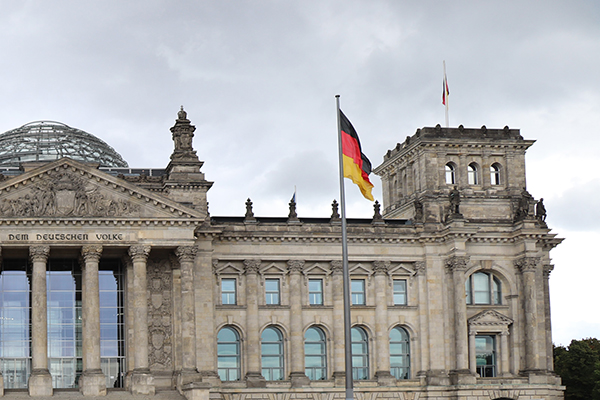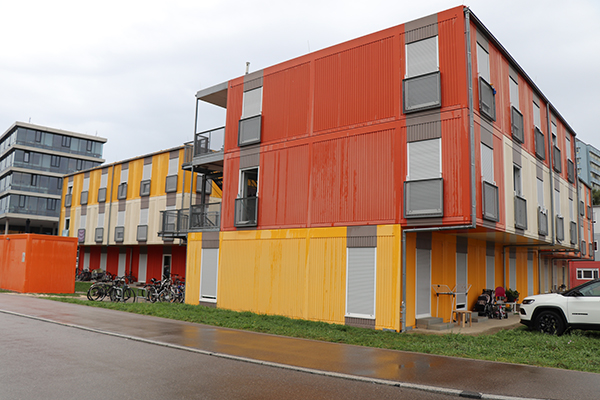By Qoutayba Abboud
Many refugees who came to Germany since 2015 can and want to apply for German citizenship now. In order to obtain German citizenship, certain requirements must be met, such as length of stay in Germany, residency status, German language skills, or livelihood security. In addition, the application process for naturalization of families with children differs from that for single persons. To learn more about this, tünews INTERNATIONAL visited the naturalization office of the Tübingen District Office, which is responsible for the entire district, and found out about the requirements that apply specifically to families with children.
The question of whether there are differences in the laws and requirements for applying for citizenship between the federal states or even the individual counties is often asked. The Naturalization Board emphasizes that “while there are legal foundations for all states, there are also administrative regulations in the states that define how the law is to be implemented. This can lead to different interpretations, as there is room for discretion. However, these differences should not be serious.”
According to the law, one is eligible for naturalization if he or she has had eight years of legal and uninterrupted residence in Germany. There are also possibilities for naturalization after six or seven years of residence, provided one can prove special integration achievements. However, children could not benefit from this shortening, as they are usually not able to prove such integration achievements. Therefore, it was previously not possible for children to be naturalized together with their parents if the parents applied for naturalization after six or seven years. In this case, the children still had to wait until the parents had reached eight years of residence. However, the legal opinion on this changed last year. The Federal Ministry of the Interior has specified that the naturalization of children with their parents is also possible after six or seven years, if special integration achievements of the parents are proven. This is intended to enable the uniform naturalization of families.
According to the naturalization authority, young people can only apply for naturalization after eight years without the involvement of their parents. However, special integration achievements, such as successful completion of school from the age of 16, may result in the period of residence for them being reduced to six or seven years. Possible receipt of benefits by parents through public funds has no effect on the naturalization of young people. Economic integration through one’s own income is required in principle, but receipt of benefits through public funds need not be an obstacle to naturalization if the persons do not have to account for this receipt—for example, because of raising children or for health reasons. However, the decision on naturalization depends on individual circumstances and may be interpreted differently by different authorities due to discretionary powers.
According to information from the naturalization authority, a family will incur fees for naturalization. The parents each pay 255 euros and the fee for children under 16 is 51 euros if they are naturalized together with their parents. However, if an application for naturalization is made for the children independently of the parents, the fee for each child is 255 euros. From the age of 16, the fee depends on income. If a 16 year old already has their own income, they can also be charged the 255 Euro fee.
Proficiency in the German language is a necessary requirement for obtaining German citizenship. Since 2007, this requirement has been set in legislation to at least B1 language level. Regarding the economic status of a family, it is sufficient if one parent is employed. In this case, the income is calculated for the whole family. Even if a mother has a small child and therefore cannot work, this is not an obstacle to obtaining citizenship as long as the father’s income is sufficient to cover her daily needs.
The Naturalization Board also pointed out that the federal government is preparing a new law on naturalization. In it, for example, shorter residence periods than before are to be stipulated for naturalization. In addition, dual citizenship is also to be made possible, which means that one would no longer have to give up one’s previous citizenship, as is currently required by law. The bill must be passed by the Bundestag and Bundesrat and is currently the subject of controversial debate. The law is expected to come into effect on July 1, 2023 at the earliest.
More information on naturalization on the website of the Federal Government Commissioner for Migration, Refugees and Integration at:
https://www.integrationsbeauftragte.de/ib-de/ich-moechte-mehr-wissen-ueber/einbuergerung/einbuergerung-auf-einen-blick-1865116
tun23022302
www.tuenews.de
Das Reichstagsgebäude in Berlin. Foto: tünews INTERNATIONAL / Mostafa Elyasian.
001910




